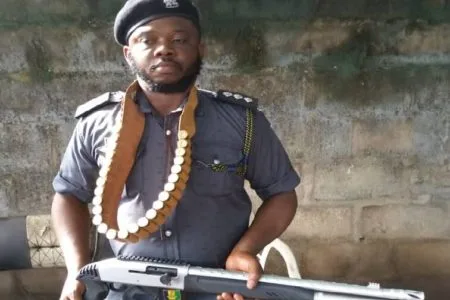Do Spy Police Officers in Nigeria Carry Guns? See Answer
In the Nigerian police force, there exists a category of officers known as “spy police.” These are not undercover agents in the traditional sense, but rather civilian volunteers who undergo training and are authorized to assist with specific police functions.
Unlike regular police officers, however, their role comes with limitations. One key question surrounding these “spy police” is their ability to carry firearms. This begs the question: Do spy police officers in Nigeria have the authorization to carry guns? Let’s delve into the details and explore the regulations surrounding their role and equipment.

SPY POLICE VS. REGULAR POLICE: THE DIFFERENCES IN RESPONSIBILITIES AND TRAINING
In one of our previous posts, we offered a comprehensive insight on how to differentiate between the regular police from the Nigerian spy police officers. In this section, we provide the differences based on their various roles and training.
ROLES AND RESPONSIBILITIES
The duties of regular police officers in Nigeria are comprehensive. They handle a wide range of issues, from maintaining public order and investigating crimes to making arrests and carrying out traffic enforcement. They are the primary force for national security and operate with a broad mandate.
In contrast, spy police (officially known as Supernumerary Police) have a more focused role. They are typically deployed at the request of private organizations or government entities to provide security for specific assets or locations. This could include banks, airports, government buildings, or even the residences of high-profile individuals. Their primary function is to deter crime and maintain order within their designated area. To learn how to join the spy police in Nigeria, you should visit the police training school at Ikeja.
EQUIPMENT AND TRAINING
Both regular and spy police undergo training at the Police Training School. However, the focus and duration of their training differ significantly. Regular police receive comprehensive training in law enforcement procedures, self-defense tactics, and the use of firearms. This equips them to handle potentially dangerous situations and make arrests.
Spy police, on the other hand, receive training that emphasizes security awareness, observation skills, and access control procedures. They are not trained in the use of firearms and are not authorized to carry them while on duty. In fact, the duration of training a spy police officer is three months and it is usually the basics.
This distinction in equipment reflects the difference in their roles: regular police serve a broader enforcement function, while spy police focus on preventative security within a specific environment.
REGULATIONS AND LAWS
The authorization to carry firearms in Nigeria is tightly controlled by law. The primary legislation governing this is the Nigeria Police Act of 2020. This act outlines the powers and duties of the police force, including the use of lethal force. It clearly stipulates that only commissioned police officers, who have undergone the proper training and meet specific criteria, are authorized to carry firearms while on duty. ALSO SEE: HOW TO OWN A GUN IN NIGERIA.
Furthermore, the Nigeria Police Guidelines for Recruitment/Promotion/Discipline of Supernumerary Police (SPY) (2013) specifically address the limitations of spy police. These guidelines explicitly state that spy police are not allowed to carry firearms or wear the standard police uniform. This reinforces the separation of duties between regular police and spy police, ensuring that only properly trained officers have access to potentially lethal weapons.
CONCLUSION
In conclusion, spy police officers in Nigeria are not authorized to carry guns. Their role is distinct from regular police, focusing on preventative security within designated areas rather than broader law enforcement duties. This distinction is reflected in their training and equipment, with regular police receiving training in firearm use and spy police not. Additionally, Nigerian law and police guidelines clearly restrict the carrying of firearms to commissioned officers, further solidifying the limitations placed on spy police.
While highly unlikely, there might be exceptional circumstances where a force spy police officer is authorized to carry a firearm. This would likely require specific approval from high authorities and would be a rare occurrence. This type of spy police officer would be working closely with the regular police.
Maintaining this distinction between regular and spy police is crucial for public safety. Regular police, with their in-depth training in firearm use, are equipped to handle potentially dangerous situations. Spy police, focusing on observation and access control, complement this role by deterring crime within their designated areas. This clear separation of duties ensures that only properly trained officers have access to potentially lethal weapons, minimizing the risk of accidents or misuse.